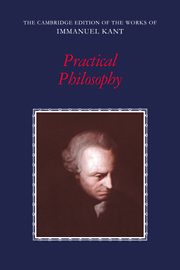Book contents
- Frontmatter
- Contents
- General editors' preface
- Preface
- General introduction
- Review of Schulz's Attempt at an introduction to a doctrine of morals for all human beings regardless of different religions (1783)
- An answer to the question: What is enlightenment? (1784)
- On the wrongfulness of unauthorized publication of books (1785)
- Groundwork of The metaphysics of morals (1785)
- Review of Gottlieb Hufeland's Essay on the principle of natural right (1786) [translated and edited by Allen Wood]
- Kraus's review of Ulrich's Eleutheriology (1788)
- Critique of practical reason (1788)
- On the common saying: That may be correct in theory, but it is of no use in practice (1793)
- Toward perpetual peace (1795)
- The metaphysics of morals (1797)
- On a supposed right to lie from philanthropy (1797)
- On turning out books (1798) [translated and edited by Allen Wood]
- Editorial notes
- Glossary
- Index of names
- Index of subjects
Groundwork of The metaphysics of morals (1785)
Published online by Cambridge University Press: 05 June 2012
- Frontmatter
- Contents
- General editors' preface
- Preface
- General introduction
- Review of Schulz's Attempt at an introduction to a doctrine of morals for all human beings regardless of different religions (1783)
- An answer to the question: What is enlightenment? (1784)
- On the wrongfulness of unauthorized publication of books (1785)
- Groundwork of The metaphysics of morals (1785)
- Review of Gottlieb Hufeland's Essay on the principle of natural right (1786) [translated and edited by Allen Wood]
- Kraus's review of Ulrich's Eleutheriology (1788)
- Critique of practical reason (1788)
- On the common saying: That may be correct in theory, but it is of no use in practice (1793)
- Toward perpetual peace (1795)
- The metaphysics of morals (1797)
- On a supposed right to lie from philanthropy (1797)
- On turning out books (1798) [translated and edited by Allen Wood]
- Editorial notes
- Glossary
- Index of names
- Index of subjects
Summary
Introduction
Kant's short treatise Groundwork of the Metaphysics of Morals is by far the best known of his writings in moral philosophy. Its influence has been out of all proportion to its size; so too has been the amount of commentary, interpretation, criticism, and debate to which it has given rise. Yet we have little historical evidence about Kant's decision to write this treatise. Like the Critique of Practical Reason, it seems to have been almost a by-product of his plan to write a “metaphysics of morals,” the vicissitudes of which are outlined in the editorial introduction to The Metaphysics of Morals. Early in 1784 Kant's friends and associates began to mention in their correspondence his work on a “Prodromus” or “Prolegomena” to his metaphysics of morals. In September of that year Hamann reported that Kant had sent off the manuscript of his Grundlegung zur Metaphysik der Sitten, and in April 1785 that he had received four copies of the book from his publisher in Halle.
Kant's reasons for writing a treatise preliminary to his metaphysics of morals are adequately explained within the Groundwork itself. Before the supreme principle of morality is applied to human nature it should be exhibited in its purity. Three years earlier, in the Critique of Pure Reason and in his lectures on ethics roughly contemporaneous with it, Kant had recognized that the principle for appraising actions as duties is the formal principle expressed in “the categorical imperative.”
- Type
- Chapter
- Information
- Practical Philosophy , pp. 37 - 108Publisher: Cambridge University PressPrint publication year: 1996
- 155
- Cited by



